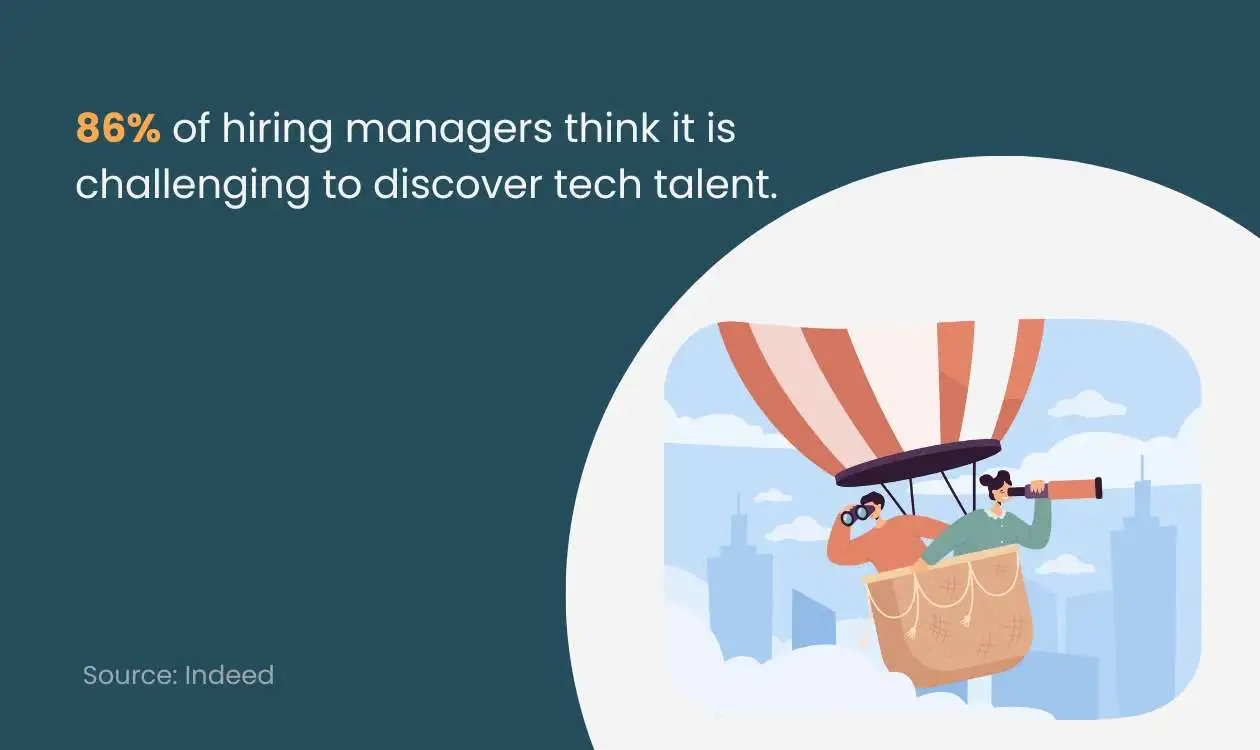It’s true that sourcing and hiring the most suitable candidates requires teamwork and a collaborative recruitment approach. Therefore, every team member ought to work closely with the hiring managers and recruiters to make the recruitment workflow more effective. In this type of collaborative hiring, the hiring manager plays a vital role. According to the de facto, the hiring manager should play a central role in this process.
However, recruiters and hiring teams often struggle to involve hiring managers in the process. a survey by Gallup discovered that 51% of hiring managers are disengaged, and 14% are actively disengaged.
So to keep this problem in mind, this solution-oriented blog will talk about the practical solutions to effectively engage hiring managers in the recruitment process. But before that, let’s first understand the basics!
What is Hiring Manager?
A hiring Manager, also known as a recruitment manager, is a person who supervises the recruitment process to fill the open position in a company or organisation by hiring top-quality candidates. They closely work with the hiring team (recruiters, HR lead, direct supervisor, sourcing team, and core team members) to streamline the recruitment workflow and understand the company's requirements. Also, the hiring manager takes Key decisions and monitors the efficiency and effectiveness of the recruitment process.
Responsibility of a Hiring Manager
Let’s now understand the key roles and multiple duties of the hiring manager in the recruitment process. The following are the primary work the hiring manager is responsible for:
-
Requesting an available position that needs to be filled.
-
Identifying the requirement of the open position.
-
Creating and guiding on the accurate job description.
-
Setting realistic expectations for what applicants should and must have.
-
Determining the roles and responsibilities of the hiring team.
-
Coordinating with the hiring team.
-
Guiding effective job advertisement and sourcing strategies.
-
Deciding an interview strategy with the collaboration of recruiters.
-
Interviewing applicants.
-
Finalising the selected candidates.
-
Working with HR to make decisions on compensation, perks, and benefits.
-
Establishing the onboarding timelines and extending the job offer.
-
Reviewing the recruitment metrics and providing constructive feedback to enhance the recruiting strategy.
Why do Collaborative Teams Struggle to Engage Hiring Managers?
According to a world report by U.S.News, disengaged managers cost the US economy between $319 billion and $398 billion per year. Frequently the reasons could be either prior negative experiences or a communication gap on why the hiring manager is not fully involved and committed to the recruitment process.
It’s true that hiring managers are not satisfied with HRs’ approach to conducting the process and 71% of managers believe that HRs must improve the quality-of-hire and hiring strategy found in a survey by Visier.
The following are the common problems the hiring team faces involving the hiring manager in the hiring process. Let’s understand them one by one.
-
Often, hiring managers are not satisfied with the quality of the candidates.
-
Sometimes, recruiters and hiring managers have different opinions on recruitment strategies and which stage should take how much time.
-
The hiring team dealt with the unrealistic expectations of the hiring managers.
-
The hiring manager failed to convey the clear requirement of the open role demands.
-
Hiring managers want to fill the open position in a shorter time.
-
Hiring managers have high and unrealistic expectations of recruiters.
-
Lack of communication between the hiring team and hiring managers.
-
The hiring manager is either busy or preoccupied with other important tasks.
-
Hiring managers may doubt their ability to screen and interview applicants.
Proven Tips to Involve Hiring Manager in the Recruitment Process
The approach to involve the recruitment manager might differ on a case-by-case basis. However, the strategy you plan must simplify communication and surety that your hiring team is prepared to support and drive the hiring process forward. With that in mind, let’s look at some innovative and proven techniques to engage your hiring manager in the recruitment process.
1. Organise a discussion & training sessions
The recruitment team and hiring manager both must have a clear picture of the job requirement, education, experience, key responsibility for the open role and the recruitment approach they will execute. This way, both sides will work for the same recruitment goals, and the team will have a clearer direction for the hiring workflow.
Organisations can also arrange training and idea-sharing sessions before starting the recruitment process to educate the team about practical ways to source, screen, and hire the best talent while involving the hiring manager in the process.
2. Simplify and centralise the communication channel
Indeed, communication is the primary key factor in building healthy relationships between recruiting team and hiring managers. Therefore, the best way to streamline communication is to employ a collaborative Talent Acquisition Platform, such as Applicant Tracking System, to facilitate smoother communication through personalised communication portals. This way, the team can reduce lengthy and formal email conversations, and every team member can communicate in one place.
Also, in human-level efforts, recruiters must regularly interact with the hiring managers and update them about the process flow. So, they get the feedback of the hiring managers to smoothly run the hiring process.
3. Discover the manager’s pain point and provide a solution
The interview stage is incredibly important to screen the candidates, and the hiring manager plays a key role in this stage. A survey by Robert Half mentioned that on average, hiring managers interview 7 candidates per open position.
Although, not every hiring manager has the best interviewing skills. However, this gap can be decreased by arranging training sessions to effectively conduct interviews of the candidates. The hiring team can offer mock interviews to hiring and ask them to screen the candidate’s skills and talent and understand why they might be a good fit for the company.
In addition, the team can be more creative and offer hiring managers an out-of-the-box approach to break the conventional interview process. For example, At Dropbox, the recruitment team invites hiring managers to have an informal coffee discussion with the potential talent. It was a meeting without the burden of paperwork of the traditional interview process and allowed the hiring manager to understand the candidate’s preferences.
Finding tech talent is itself an immensely difficult task nowadays. As a result, 86% of hiring managers think that it is a challenge recruiting tech talent in this highly competitive market, as concluded in a survey by Indeed. However, the recruitment team can help to hire managers by providing them with the best sourcing channels and platforms (for example, GitHub to find top developers) to find top-quality tech talent.
4. Try to know the requirements of hiring managers
It’s true that the hiring manager has the best knowledge of the requirement of the open position demand from the candidates. Thus, it is incredibly important for recruiters and HRs to consult with hiring managers and understand the different roles the organisation is hiring for.
The hiring team can ask the recruitment managers about what exactly they are looking for, and the skills ideal applicants must have, and other essential details the team needs to take care of and pay additional attention to. The following are the criteria that require the utmost clarity:
-
Top 3 must-have skills
-
Day-to-day responsibility
-
Qualification for the role
-
Technological tools candidate must be proficient in
-
Skills set of ideal candidates
-
Overall compensation
-
Benefits and perks candidates will get
-
Time-to-fill the position - hiring manager’s expectation
This parameter gives an understanding to the team of which candidate fits into which specific role.
5. Identify potential deal-breakers
Recruiters and HRs need to keep hiring managers in the loop and let them know if candidates make any specific request related to flexible working schedules, salary expectations, and benefits and perks.
For example, the customer support field is not time-specific and requires urgent-based communication and interaction. Therefore, customer relationship executives may ask you to provide flexible work schedules according to the requirement of the clients.
If recruiters and hiring managers don’t identify and take action on these potential deal-breakers, then it results in the hiring process might start over again.
6. Be transparent and Opt for recruitment KPIs
Sharing the recruitment data of which hiring techniques worked and which haven’t. For instance, time-to-fill is a common aspect of miscommunication and affects the recruiter-hiring manager relationship. However, ATS remove this drawback by providing the essential recruitment KPIs which can be accessed by the whole team and hiring manager.
Hence, the hiring manager can discuss with the team on what can be the probable solution that will make the hiring of top talent more effective. Consistently inspecting data and conveying feedback about the workflow results in a transparent process.
Closing Thoughts on Hiring Managers' Involvement in Hiring Process
In conclusion, recruitment teams and hiring managers must remember one thing, ‘‘open lines of communication when discussing the hiring roles and transparency are the ultimate factor for the successful hiring process.’’ Hence, the willingness for more open communication during recruitment can foster strong relationships with the hiring managers and recruit top candidates more efficiently. Therefore, the team must ensure that everyone is on the same page. Also, recruiters and hiring managers must work together and find the hiring requirements and determine realistic expectations.
To wrap this up, In this blog, we’ve covered the practical tips to fully involve your hiring manager in the recruitment process.
Happy Collaborative Hiring!!
Do you want to conduct collaborative hiring effectively by hiring the best-quality candidate? Click below to discover more on how to Involve every team member and make them feel valued in cooperative recruitment.












